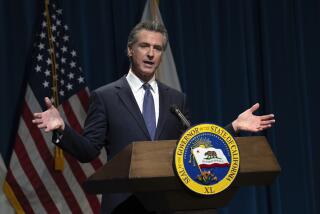Obama budget to propose surpassing spending limits by $74 billion
President Obama will propose spending about $74 billion more next year than is allowed under federal spending caps, a revival of his push to end across-the-board spending cuts imposed under a bipartisan compromise.
Due out next week, Obama’s budget for the next fiscal year will seek an approximate 7% increase over the levels set by the so-called sequestration cuts, a White House official said Thursday. The increases include about $37 billion over the limits for domestic discretionary spending, bringing the total to $530 billion. The president will seek $561 billion in defense spending -- about $38 billion over the caps.
Obama is slated to rally Democrats around the plan Thursday night in a speech to House Democrats meeting in Philadelphia for an annual strategy session.
Obama’s spending plan is the beginning of a budget negotiation that will for the first time of his tenure in office be led on the congressional side entirely by Republicans, a group unlikely to embrace the significant increases to domestic programs Obama has proposed, such as free community college, expanded public preschool and new tax credits for child care and college education.
White House spokesman Josh Earnest described the budget Thursday as reflecting the president’s views and priorities, not necessarily an overture for compromise.
“No president has ever put forward an budget with the expectation that Congress is going to pass it in its current form,” Earnest said.
In the past, Obama has blasted the spending caps as “meat cleaver,” indiscriminate cuts that would slow the economic recovery. He’ll likely have to tweak his argument this year as he launches an effort to claim credit for the economic rebound and lower the federal budget deficit.
On Thursday, Earnest argued that the recovery “would have been even stronger” if the president’s economic policies had been adopted.
“There is better way that we could have succeeded in reducing the deficit, that would have asked those at the top of the income scale to pay a little bit more, for us to ask the big banks on Wall Street and the large financial firms on Wall Street to pay a little bit more,” Earnest said. “That that would have been a fairer way for us to reduce the deficit.”
The president plan divides the increases equally between domestic and defense spending -- holding to a one-for-one allocation that the White House insisted on in the last round of budget negotiations. Earnest suggested that the president would hold to that this time around, saying it “certainly seems a principle that’s worthwhile.”
The increases would be paid for by closing tax loopholes and trimming inefficiencies and wasteful spending, said the official, who would not be named discussing the plan ahead of the release of the budget. The president already unveiled a tax plan that would raise $320 billion in new revenue to pay for new tax credits and programs aimed at helping the middle class pay for college, child care and job training.
Obama unveiled the plan, which he dubbed “middle-class economics,” ahead of his State of the Union speech last week – hoping to frame the debate for the budget fights ahead.
“Obama will show how we can invest in his vision for middle-class economics by making paychecks go further, creating good jobs here in the United States, and preparing hardworking Americans to earn higher wages,” said a White House official, who would not be named when speaking ahead of the president’s remarks.
House Democrats say they are prepared to help carry the middle-class economics message forward.
“He set the table. And now we’ve got to dish out the meal legislatively,” said Rep. Steve Israel of New York, who is heading up a new policy and messaging committee for the House Democrats. “That was a perfect launch for a message that we can all galvanize around and mobilize around. And that’s precisely what we’re going to do.”
Asked at the Philadelphia retreat about Obama’s forthcoming budget plan, the top Democrat on the Budget Committee said new spending on education, infrastructure and science and research would be “absolutely critical” to growing the economy.
“He’s going to have a very robust agenda,” said the Democrat, Rep. Chris Van Hollen of Maryland, declining to offer specifics before the president’s address. “Stay tuned.”
Staff writer Michael A. Memoli in Philadelphia contributed to this report.
For more White House coverage, follow @khennessey
More to Read
Start your day right
Sign up for Essential California for news, features and recommendations from the L.A. Times and beyond in your inbox six days a week.
You may occasionally receive promotional content from the Los Angeles Times.







